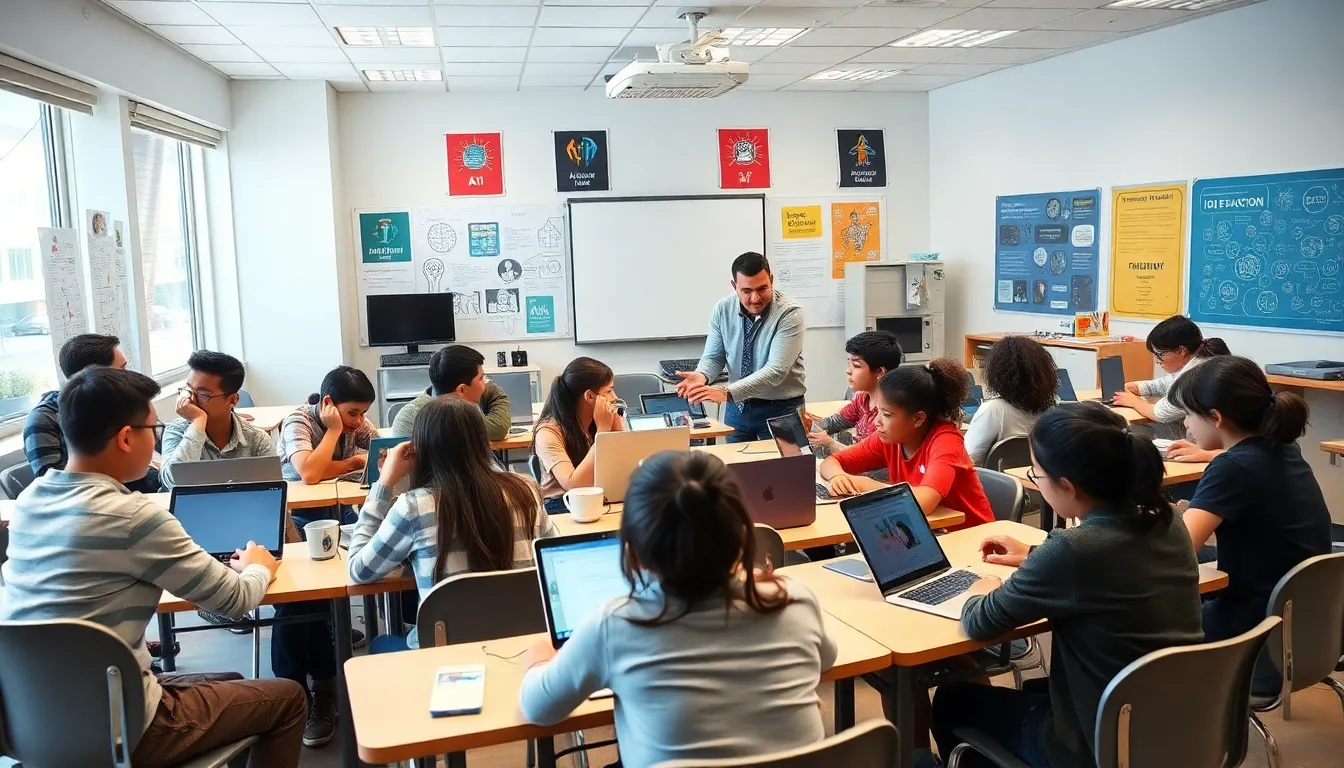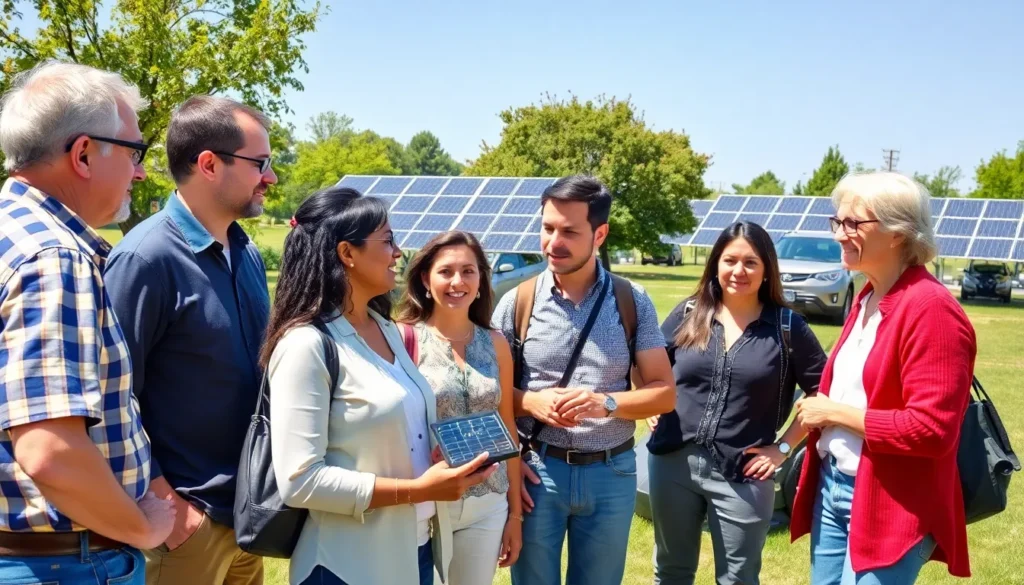In a world where smartphones seem to have more power than our high school teachers, it’s no surprise that education technology, or edtech, is taking center stage. Gone are the days of dusty chalkboards and endless textbooks. Today’s classrooms are buzzing with innovation, transforming how students learn and teachers teach. Edtech isn’t just a trend; it’s a revolution that’s here to stay.
Table of Contents
ToggleOverview of Edtech
Education technology, commonly known as edtech, encompasses a broad range of digital tools and resources. The integration of technology into learning environments reshapes teaching methodologies and enhances the educational experience.
Definition of Edtech
Edtech refers to the use of technology to facilitate and enhance learning processes. This includes software programs, online courses, and interactive apps that support both educators and students. By leveraging digital platforms, educational institutions aim to create more engaging and personalized learning experiences. Tools like learning management systems and virtual classrooms represent just a fraction of the diverse technology used in education today.
Importance of Edtech in Education
The importance of edtech stems from its ability to improve educational outcomes significantly. Data shows that students using digital tools often perform better than those relying solely on traditional methods. Additionally, edtech promotes accessibility, allowing learners from various backgrounds to receive quality education regardless of location. The ability to track and analyze student performance through digital systems provides valuable insights for educators, enabling tailored instruction. Importantly, edtech fosters collaboration and communication, preparing students for a technology-driven workforce.
Key Technologies in Edtech

Edtech encompasses various technologies that enhance the educational experience. Notably, several key technologies stand out in shaping modern learning environments.
Learning Management Systems (LMS)
Learning Management Systems play a crucial role in the digital education landscape. These platforms provide structured environments for course management and user engagement. Common features include tracking student progress, facilitating communication, and enabling resource sharing. Popular LMS options like Moodle, Canvas, and Blackboard offer customizable interfaces that suit various educational needs. Students benefit from easy access to course materials and can interact with peers and instructors efficiently. Faculty can monitor insights derived from performance analytics, leading to improved instructional strategies.
Gamification in Learning
Gamification integrates game-like elements into educational experiences. This approach increases student motivation and encourages participation through rewards and challenges. Tools that incorporate gamification, such as Kahoot! and Quizizz, allow learners to compete in a fun, interactive way. Research shows that students engaged in gamified learning often exhibit higher retention rates. By making learning enjoyable, gamification fosters a positive attitude toward education and enhances collaboration among learners. Ultimately, this technology creates an immersive learning environment that appeals to diverse student demographics.
Artificial Intelligence in Edtech
Artificial Intelligence significantly transforms educational methods through personalized learning experiences. AI-driven platforms adapt content to fit individual learning styles and pace, offering tailored support to students. Tools such as chatbots facilitate instant feedback, addressing student queries in real-time. AI also streamlines administrative tasks, allowing educators to focus more on instruction. Schools leveraging AI-based analytics can identify learning gaps and inform instructional approaches effectively. By targeting specific student needs, AI enhances educational outcomes and improves overall engagement.
Benefits of Edtech
Edtech offers numerous advantages that enhance the educational landscape. It enriches the learning process, making education more engaging and effective.
Enhanced Learning Experience
Active learning becomes a reality with the use of edtech tools. Students interact with materials more dynamically, which increases their motivation. Interactive apps and online courses provide diverse resources that cater to various learning styles. Immediate feedback helps learners grasp concepts quickly, leading to better retention. Technology fosters collaboration through discussion forums and group projects, enhancing peer interactions. These elements create a stimulating environment where creativity thrives.
Accessibility and Inclusivity
Edtech breaks down barriers to education, making learning accessible for everyone. Students in remote or underserved areas can participate in high-quality education through online platforms. Technologies accommodate different learning needs, ensuring that all students have equal opportunities. Flexible scheduling allows learners to study at their own pace, fitting education into their lifestyles. Moreover, resources in various formats cater to learners with disabilities, promoting inclusivity. This commitment to equal access helps bridge educational gaps.
Data-Driven Insights
Data analytics play a crucial role in understanding student performance and needs. Educators can track progress through Learning Management Systems, identifying areas that require attention. Customization of lesson plans becomes possible as instructors analyze trends in data. A clear picture of each student’s journey helps tailor instruction, maximizing learning outcomes. Furthermore, timely assessments reveal insights into teaching effectiveness, enabling continuous improvement. Data empowers educators to create targeted interventions, enhancing overall educational quality.
Challenges in Edtech
Edtech faces various challenges that can hinder its full potential. Key issues include technological barriers and data privacy concerns.
Technological Barriers
Underdeveloped infrastructure can limit access to edtech tools. Many schools lack reliable internet connections, making online learning difficult or impossible. Equipment such as computers and tablets often remains insufficient, preventing equal opportunities for all students. Digital literacy plays a critical role; many educators and students need more training to effectively use available technologies. Inadequate resources contribute to a gap in effective implementation, impacting overall engagement. Thus, ensuring equitable access becomes essential for maximizing the benefits of edtech.
Data Privacy Concerns
Data privacy remains a significant concern in edtech. Students’ personal information, collected through various platforms, often lacks adequate protection. Cybersecurity threats pose risks to sensitive data, raising alarms for parents and educators alike. Additionally, compliance with laws like FERPA and COPPA requires strict adherence, further complicating data management. Transparency in data usage is essential; educational institutions must communicate clearly about how data is collected and utilized. Addressing these privacy issues is vital for fostering trust and promoting safe learning environments.
Future Trends in Edtech
Education technology continues evolving, shaping the future of learning through innovative trends.
Personalized Learning Innovations
Personalized learning innovations transform how students interact with educational content. Tailored instructional strategies meet individual student needs, helping them progress at their own pace. Adaptive learning algorithms analyze performance data to provide customized resources and exercises. Tools like intelligent tutoring systems offer real-time feedback, allowing students to focus on areas where they struggle. Assessments adjust based on learning patterns, ensuring more effective learning experiences. Such personalization boosts engagement and retention, ultimately leading to better educational outcomes.
Growth of Mobile Learning
Mobile learning gains momentum, reflecting the increasing reliance on smartphones and tablets for educational purposes. Accessibility expands as students can engage in learning anytime and anywhere. Edtech applications optimize material presentation for smaller screens, enhancing user experience. Collaboration tools support group projects and discussions on mobile platforms, promoting peer interaction. Statistics indicate that 91% of students access educational content via mobile devices. This growth encourages educational institutions to integrate mobile-friendly materials, making learning more flexible and inclusive for diverse learners.
The evolution of edtech is reshaping the educational landscape in profound ways. As technology continues to advance, its integration into classrooms becomes increasingly essential. Educators and students alike benefit from the personalized and engaging learning experiences that edtech provides.
While challenges like technological barriers and data privacy concerns remain, addressing these issues is crucial for unlocking the full potential of educational technology. The future promises exciting developments in personalized learning and mobile education, paving the way for a more inclusive and effective learning environment. Embracing these innovations will empower learners and educators to thrive in a rapidly changing world.






